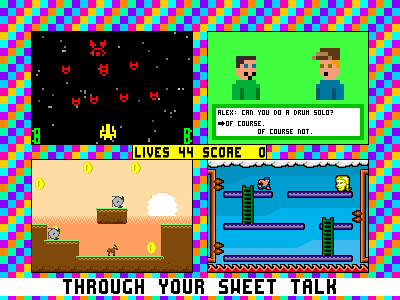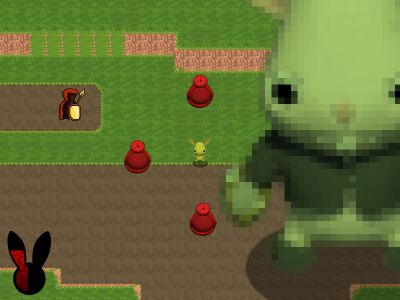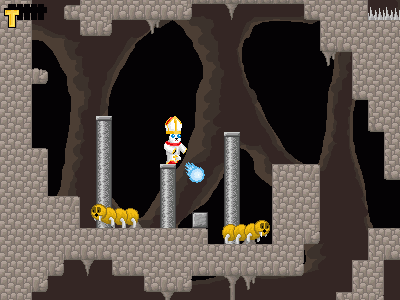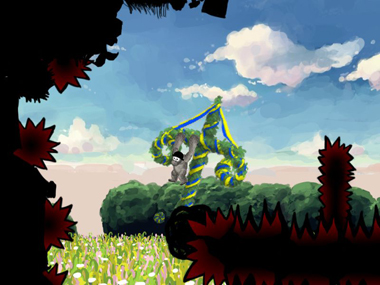The Age of Exposition
I am a bit late to the party on this but it seems at least two anonymous developers have tried to make revelations of inside information in the games industry lately; one outing DotA developer IceFrog and another sharing strong words about the development of Warhammer Online. Things like these have a tendency to pop up in comments when bad things happen to games, but since two separate people have gone through the trouble of starting up blogs to voice their concerns there is a risk of a trend starting.
I am not really interested in commenting on the specific cases. The decline in the global economy hit the games industry as hard as anyone else, but some of us were still surprised since there was a general idea that entertainment products – or at least the relatively cheap ones – were exempt. Needless to say, a lot of studios have had hard times and there is a lot of pent-up aggression among developers.
That is not to say there is no merit to the arguments put forth by the striving whistle-blowers, though. I believe there are at most larger game studios people in managerial positions that are not cut out for their role. Making games is an interdisciplinary craft and on the level we have arrived at, understanding each discipline to the depth it requires to make informed decisions about it has become impossible. Sitting high up in a large corporate structure it becomes near impossible to see where the actual responsibilities lie when things break. People who does not actually contribute have an easy time getting lost in the bureaucracy, often not knowing themselves how expendable or downright damaging they are to the company – heck, in bad cases no-one might know who is actually doing anything and it might be impossible to find out.
This, of course, births problems and confusion and brings me to my point – problems exist at all studios. People speaking up after a failure might give the impression that a project was obviously doomed, everybody who worked on it knew about it and it was only because of the ignorance of some higher-up who never even looked at the game that it was even allowed to continue.
This is not really the case – all of the larger projects (both professional and hobbyist) I have personally been a part of have had severe problems and on occasion seemed to be on the verge of failing completely. Had they done so, I could easily have written long rants about why that was but instead I remember them as hard times were we came through and obstacles we overcame.
Success makes you magnanimous like that just like failure can make you bitter, I suppose.
No More Sweden 2010

No More Sweden occurred again, this year in the town of Skövde. Less places to go to, but easier to get around and a – thankfully – air-conditioned locale. I did make a game, but it wasn’t very good… And not in a “I had a cool idea but it didn’t work out” – way, rather a “I did something completely uninspired just to do something” – way. Anyhow, I’m not going to post it so the above picture is from Daniel Remar’s brilliant entry Man Enough. Hopefully the game and the soundtrack will be available within the next few days.
The organizers have stated that they want this to be more of a gathering than a jam though, and it is definitely moving in the right direction. Lots of interesting presentations were held on different topics and a lot of time was spent just relaxing in discussion and trading stories. Coming straight from an increasingly commercial mainstream games industry, it is a true breath of fresh air to meet people who think that games can be something more, do something new and mean something else – and people who also are not afraid to try it out.
Edmund on Difficulty
Edmund McMillen has a short piece on Gamasutra about the evolution of difficulty in games, a fairly lightweight piece and nothing really new if you’ve been keeping up the last few years, but an amusing read at least. Also, the 2009 Game Developer Salary survey results for independent developers have been posted, the first time GDM includes this category. Considering the very low average I’m guessing that there are a lot of different people being analyzed together; people working full-time, people working for free, on the side, gaining funds from alternative sources etc, so the average is not in itself that interesting. Nevertheless, a good idea that hopefully becomes a bit more structured in the future.
A Jam and a Rant

Another iteration of Gotland Game Jam, this time I worked with artists Zenobia Homan and Jona Marklund to create the game Masquerade [download win32]
The theme of the jam was “the Play” and Masquerade is a top-down brawler where the participants are actors on a stage using costumes lying around to act out the roles of different kinds of warriors. In all honesty, this is design-wise not very different from simply picking up new weapons, but as we all wanted to make something complete innovation took a backseat to playability. It was a while since I last made a top-down brawler but what was really new for me was the basic AI of enemies with quickly changing abilities, luckily I did not need to worry about art so I had plenty of time to get it to a functional level. The end result is nothing spectacular, but a decent diversion if I may say so myself.
Some friends and acquaintances I have in the indie scene have told me that they usually do not go to these kinds of events to create games anymore, rather they just try to have a good time and meet people. I am starting to see why – not that I do not like making short games under pressure, but the tradeoffs you make are starting to become apparent. First of all, making a game in 40 hours can be a very demanding experience that you really have to prepare for and plan around, and fun as it is there are more enjoyable and productive things to spend your time on once you have done it a few times.
But also, there is some limit to what you can accomplish. I know a lot of people are championing rapid prototyping and I do not argue that it is a good way to create good games, I just do not think it is the only way. You can create great core mechanics in a short time, but for some ideas the greatness lies in the scope. The thing separating a great game from a poor one might be production values or long iteration times as well as a great core mechanic, and I think that by being short-sighted you can loose a lot of great ideas. Alec Holowka touched upon this awhile ago. I do not really buy into the whole “If a game idea is not fun after the first two hours of prototyping it needs to be scrapped” – mindset, it reminds me of the larger games industry, the impatient industry where books are written about the concept of the “elevator”-pitch.
In short, I think the amount of time we spend on being quick is staggering and it thus misses the point. Whether we are pitching a game to a publisher or trying to sell our own image as developers to the indie crowd I think the entire game development world could benefit from more wanting to create good games and less wanting everybody to know about them immediately.
… But then again, I guess there are a lot of people who are developing good games anonymously – we just do not see them.
Global Game Jam
The Global Game Jam was this weekend, and after failing to set up a local event me and a few friends decided to go to the Nordic Game Jam, reportedly the largest GGJ site. Besides hanging out with friends, acquaintances from the indie scene and making a few new connections, we (Juha, Martin, Tobias and I) created a short game called “Fake“.
We were in development up until the final minutes so there is no proper tutorial; consider this an introduction. Your role is that of an art forger working for the mysterious mafioso “Don Key”. Funds being sparse, you are limited to cut and paste existing images in order to reproduce the paintings.
Start out by selecting a painting, then selecting a theme for your photos on the right. You can re-select the theme later by clicking the button on the top-right but it will reset your work. Click any of the images on the right to select a source, then use the left mouse button to cut out a pattern and use it on the forgery. The left menu bar can be used to select or move the active layer, you can also use the right mouse button to delete a layer. When not cutting a picture, you can move the active layer with the left mouse button, rotate it with the right or press both mouse buttons to scale it. The button on the top left will swap the preview mode of the real painting, how it is shown will have no bearing on the final result, though. When you are done, press the button second from the right at the top to submit the painting for approval by Don Key.
I was really out of my element when hacking this together and too much time went into hacking GUI elements that a proper tool would’ve provided for me. This being the case, the final version does not only miss a proper tutorial but also some basic UI elements and it comes with a lot of bugs. That being said, the game was fairly fun for what it was, the idea feels solid and we managed to make a game out of the development itself by taking pictures of jam attendees and using them in the final version – always fun to do at events like this. All in all, we had a great time at least.
Sadly, we had to leave halfway through the finals and I have not seen very many of the other games from NGJ yet. I would like to give a shout out to Shoot Stop Lollipop and Shadow Ninja… Monkey though, as they both had genuinely interesting gameplay mechanics.
Gotland Game Jam 2009

Gotland Game Jam is an event consisting of a 48 hour game-making competition for students and ex-students of the Game development education of Gotland University. As my participation was offsite and I spent most of the weekend on IRC I do not have that much to say about the actual event, though I did play the games created and there were some delightfully weird creations among them.
My own contribution is metroidvania based on the theme “Popecat” called Leim [download]. I am reasonably happy with how it came out.
To be completely honest, I had decided beforehand that I was going to make a metroidvania platformer and crowbar it into whatever theme selected for the Jam; there are sure to be people who consider this the wrong approach to take to a gamejam (and with good reason), but to paraphrase Jon Mak it is usually a better idea to make something you really want than to force innovation for innovation’s sake. There are some other drawbacks though.
For starters, exploration games tend to be sort of a tall order and maybe trying to make a worthwhile one in 48 hours is a lost cause. You need a lot of content to make it interesting, and if you are growing the avatar abilities there are lots of things that can break the level design, forcing you to play it very safe if you do not want to create a horribly broken game. Also, going against what John Harris said about interesting environments I tried to force small areas where each had some gameplay idea instead of doing what I should have done, attempt to create ideas for the world and then build levels around those ideas (although again, maybe not feasible in 48 hours). Adding to this is the central hub I placed in the game and the ever-decreasing energy – originally the idea was meant to allow for incrementally more exploration as getting more energy allowed you to move further in the gameworld instead of having obvious borders, but the concept didn’t really mesh with that idea and all it did was discourage exploration. The cohesiveness of the experience was sort of tacked-on as well as I had to remove a lot of the themes and presentation ideas I had in store, again due to lack of time.
Technologically, this wasn’t really a challenging game and although I did sort of fail design-wise I would say I learned enough from it to make the weekend a worthwhile experience. Anyhow, it was very much fun so perhaps it didn’t have to be in the first place.
Numbers from 2D Boy
World of Goo was released a little more than a year ago now, and in celebration 2D Boy had a “name your own price” – week. This seems to have gone well and they are now prolonging the week until sunday. As they have done before, 2D boy have also posted some stats relating to the events, suggesting that people tend to pay what they can afford rather than what they think the game is worth (or, if you are a skeptic, that people tend to rationalize), among other things.
I disagree with Carmel’s conclusions sometimes – for example while I am sure they were right to skip DRM for World of Goo (and I, on a personal basis, dislike DRM), I have to play the devil’s advocate and point out that the financial and legal situation for a large corporation shipping a mainstream game is quite different and I do not think his reasoning can be applied universally. On the other hand, I do not think that was his intentions either and – this being the important part – the fact that 2D Boy are so open with their statistics leaves the conclusions up to the reader entirely. Looking over the numbers and quantized facts about game development is always interesting, especially when it concerns a game as good as World of Goo.
No More Sweden 2009

I spent the weekend in Malmö for No More Sweden, essentially hanging out with indie developers and making a game in 40 hours. In my opinion, one of the most interesting things about the Indie scene is how different each developer takes to the craft – judging what is important, what is less important and when it is time to scrap an idea – something that shines through some of the games that were made. Hopefully, all of them will be available in the next few days – my own game, Alain, can be downloaded now.
The game is essentially a platform game that has you maneuvering an ape in order to get a maypole through a level. As with most games written in a compo under a short time limit, it has certain flaws that are there due to a lack of time – lack of time to polish, and a fear of killing my darlings seeing as there wasn’t enough time to replace thrown-out features. For example, I would like to have spent more time on the firing and climbing mechanics, seeing as it can be somewhat uninituitive and difficult to control now, and I also would have reconsidered the graphical style and gone for something that would give a clearer image of what platforms you could actually stand on.
Doing it again, I would spend less time on creating assets (although I lucked out as a friend offered to create background graphics) and more time tweaking the level design to weed out the brute-force-solutions and making the proper ones easier to perform. There’s also a bunch of features I would like to have added as they would have given me opportunity to create a lot of new and interesting puzzles, and I regret not observing people as they played the game as much as I could, as this had surely given me a lot of more things to add to this list.
Feel free to try the game and add your own comments!
Experimental Gameplay 3.0

So the Experimental Gameplay Project relaunched again, and is holding monthly prototyping competitions. Nothing to add to that, really, all is well.
On a related note, submissions are open for IGF 2010, although I have nothing to add there either other than that I hope to submit something this time. Finally, Ernest Adams wrote an interesting piece on defining games, maybe nothing earth-shattering but I am a big fan of taxonomies, they provide opportunity for discussion of both the taxonomies themselves and how different games would be placed within them – in turn furthering our understanding of the medium and birthing new ideas.
Sid Meier’s Key Design Lessons

Considering big name developers like Will Wright and Peter Molyneux, I have a tendency to disagree with about half of what they are saying – not so with Sid Meier, I have yet to see anything short of great come from him. I have played embarrasingly few of his games, something that should be redeemed – or maybe that is why I find what he says so inspiring.
Anyway, his former co-worker Soren Johnsson presents what he calls Sid Meier’s Key Design Lessons, an interesting read to say the least.
